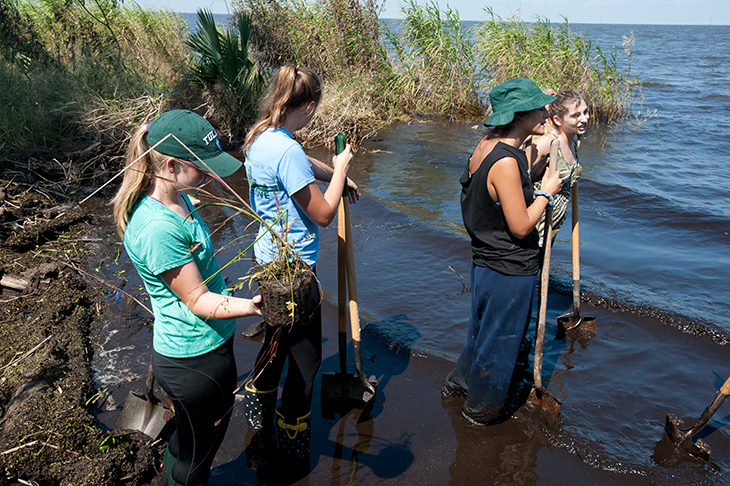Students may benefit from 'high-impact' programs

Tulane University School of Public Health and Tropical Medicine students and science students at Nunez Community College work together in St. Bernard Parish, Louisiana, on a coastal restoration project. (Tulane University photo)
When U.S. News & World Report profiled three types of programs that enhance students" college experiences, the publication singled out Tulane University for its service-learning graduation requirement.
“Freshman retention and graduation rates have both risen at Tulane since university leaders challenged students to help repair the city after Hurricane Katrina,” the story reported.
That"s good for students and for New Orleans but the good news doesn"t stop there.
About 1,800 Tulane students are enrolled in 150 service-learning courses and projects this semester, says Agnieszka Nance, executive director of the Tulane Center for Public Service.
“They want to explore, and this is a great way of exploring [New Orleans],” Nance says. “It"s introducing them to the real New Orleans not the fake, sort of touristy [version] that they see when they come the true picture.”
And now students are helping the center flourish from the inside as well. “I see a huge uptick of the student leadership element,” Nance adds, citing a growing peer-to-peer education program, among others. The Center for Public Service hired a program manager, Benjamin Brubaker, to oversee all the student leadership positions, such as the service-learning assistants.
Nance arrived at Tulane 10 years ago from Austin, Texas, and began working as the center"s assistant director in 2007. She was appointed as the second executive director of the center this past summer.
Now, she says, the center is conducting and publishing original research on the efficacy of service learning on student satisfaction and even helping other universities investigate and establish their own service-learning programs.
For the future, Nance hopes to create more resources and incentives for the Tulane faculty members who teach the service-learning courses.
“We see how hard they work, making sure the quality of their service-learning courses is growing and expanding and changing. It"s a huge responsibility, and they need to be somehow awarded for it.”
